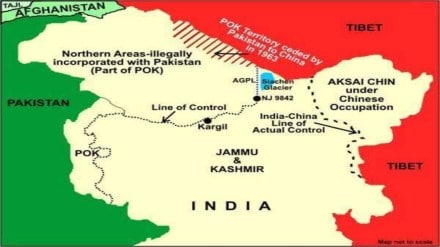By Farooq Wani
Spread over 86,772 square miles, the union territories (UT) of J&K and Ladakh share a common border with three countries – Pakistan in the West, China in the North and Afghanistan in the Northwest, which gives this region immense geopolitical and geostrategic importance. With both China and Pakistan having illegally occupied portions of these two UTs, this region has become unstable and Sino-Pak collusion has only further aggravated tensions.
While New Delhi has effectively parried off Beijing’s attempts to realign the Line of Actual Control (LAC) which demarcates the working border between India and China, tensions along the Sino-Indian borders remain. Similarly, with Islamabad brazenly continuing to wage a proxy war in J&K, Indo-Pak relations remain strained, and the international community is worried that New Delhi’s military response to Islamabad’s belligerence could escalate tension between two nuclear states.
China has vested interests in this region. While its Karakoram Highway runs through the Aksai Chin area in Ladakh, the Kashmir region is crucial to its ambitious Belt and Road Initiative (BRI) that seeks to connect Asia with Africa and Europe via land and maritime networks. The China Pakistan Economic Corridor (CEPC) runs through J&K territory under Pakistan’s illegal occupation, and this makes Beijing uncomfortable.
Pakistan is dependent on water supply from rivers flowing from the higher reaches of the Himalayan region in the Indian UTs of J&K and Ladakh. Though the World Bank brokered Indus Water Treaty gives Pakistan the right to utilise water from the Indus, Chenab and Jhelum rivers (which if efficiently harnessed is sufficient), yet it wants more.
More importantly, Pakistan sees Kashmir as the unfinished agenda of partition. However, with the UN making it clear that Kashmir is a bilateral issue which India and Pakistan have to resolve between themselves without any third-party intervention, Islamabad knows it’s lost the game.
Hence, it is using terrorists to fool the international community into believing that there is no normalcy in J&K. However, with the local population refusing to act as pawns by participating in protests and observing shutdowns orders of the pro-Pakistan Hurriyat conglomerate, even this plan has failed.
As successive governments in Pakistan have been using Kashmir as a convenient issue to distract public opinion from their own failings, Islamabad continues to sponsor terrorism in J&K. Though it knows that it will not yield any results, Islamabad doesn’t care as it has nothing to lose since those suffering and getting killed are hapless Kashmiris.
It’s a well-known fact that war is an extremely costly venture that retards a nation’s economic progress by decades. Yet, Islamabad has waged three-and-a-half unprovoked wars with India (1947, 1965, 1971 and Kargil in 1999) and a major reason for its economic crisis is the Pakistan army’s unwise decision to attack India thrice!
Islamabad needs to realise that it can’t exist solely on aid and loans from friendly countries and international financial institutions. It needs to understand that cordial relations with New Delhi is far more beneficial for Pakistan as it would lead to substantial decrease in military expenditure and more cost-effective trade.
However, while it may sound paradoxical, it’s these very advantages that are responsible for scuttling Pakistan’s efforts to normalise relations with India. While reduction of defence expenditure will facilitate utilisation of the significant savings for development and poverty alleviation projects, Pakistan’s powerful military will not accept any budgetary cuts.
Furthermore, normalisation of Indo-Pak relations will reduce the Pakistan army’s importance and people will start questioning the unconstitutional powers and unauthorised perks the defence forces enjoy. This is something that the Pakistan army Generals will never ever allow.
Cross border trade between India and Pakistan will result in sizable savings due to the reduced cost of transportation. For example, despite the current embargo on Indo-Pak trade, Pakistan is still importing certain items manufactured in India through the Middle East and this circuitous route increases the import cost.
Resultantly, while the common Pakistani ends up paying much more for such commodities, those involved in this trade end up making huge profits. Being extremely influential, the middleman lobby has the ability to sabotage any attempts at normalising Indo-Pak relations.
So, it’s for the people of Pakistan to take a call on whether their leaders should continue going around the world with a begging bowl in hand or change the status quo by eschewing hollow pride and jettisoning motivated agendas to accept ground realities.
The author is Editor Brighter Kashmir, Author, TV commentator, political analyst and columnist. Email: farooqwani61@yahoo.co.in
Disclaimer: Views expressed are personal and do not reflect the official position or policy of Financial Express Online. Reproducing this content without permission is prohibited.
